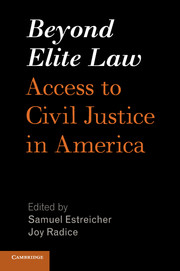Book contents
- Frontmatter
- Contents
- Beyond Elite Law
- Foreword
- List of Contributors
- Overview
- Overview
- PART I CURRENT STATE OF ACCESS TO LEGAL SERVICES
- PART II SOURCES OF LEGAL SERVICES ASSISTANCE FOR WORKING AMERICANS
- 10 Evolution of Legal Services in the United States: From the War on Poverty to Civil Gideon and Beyond
- 11 The Effect of Contingent Fees and Statutory Fee-Shifting
- 12 The Market for Recent Law Graduates
- 13 Clinical Legal Education and Access to Justice: Conflicts, Interests, and Evolution
- 14 Loan Repayment Assistance and Access to Justice
- 15 Federally Funded Civil Legal Services
- 16 New York's Lawyer Referral Services
- 17 Growth of Large Law Firm Pro Bono Programs
- 18 Institutionalizing Pro Bono
- 19 Pro Bono as a Second Career
- 20 Employer-Provided Legal Services for Employment Claims
- 21 Company-Provided Legal Services
- 22 Individualized Justice in Class and Collective Actions
- PART III FASHIONING A REFORM AGENDA
- PART IV CREATING A CULTURE OF SERVICE
- Index
12 - The Market for Recent Law Graduates
from PART II - SOURCES OF LEGAL SERVICES ASSISTANCE FOR WORKING AMERICANS
Published online by Cambridge University Press: 05 May 2016
- Frontmatter
- Contents
- Beyond Elite Law
- Foreword
- List of Contributors
- Overview
- Overview
- PART I CURRENT STATE OF ACCESS TO LEGAL SERVICES
- PART II SOURCES OF LEGAL SERVICES ASSISTANCE FOR WORKING AMERICANS
- 10 Evolution of Legal Services in the United States: From the War on Poverty to Civil Gideon and Beyond
- 11 The Effect of Contingent Fees and Statutory Fee-Shifting
- 12 The Market for Recent Law Graduates
- 13 Clinical Legal Education and Access to Justice: Conflicts, Interests, and Evolution
- 14 Loan Repayment Assistance and Access to Justice
- 15 Federally Funded Civil Legal Services
- 16 New York's Lawyer Referral Services
- 17 Growth of Large Law Firm Pro Bono Programs
- 18 Institutionalizing Pro Bono
- 19 Pro Bono as a Second Career
- 20 Employer-Provided Legal Services for Employment Claims
- 21 Company-Provided Legal Services
- 22 Individualized Justice in Class and Collective Actions
- PART III FASHIONING A REFORM AGENDA
- PART IV CREATING A CULTURE OF SERVICE
- Index
Summary
William Henderson's chapter highlights changes in the market for recent law graduates that reveal a substantial divergence between the growing supply of recent law graduates and the reality of fewer jobs in the private sector. Declining opportunities for young lawyers are offset only in part by the emergence of “JD Advantage” jobs where a law degree is helpful though not required.
Drawing upon publicly available sources of information, there are at least three significant patterns that affect the economics of legal education: (1) a steady increase in the number of law schools and graduating law students; (2) a three-decade-long decline in the percentage of entry-level jobs in private practice that predates the more recent decline in large law firm employment; and (3) in the gradual rise of a new category of post-law school employment, now called “JD Advantage” jobs, where the law degree is not required but potentially advantageous.
This third category signals a fundamental change in the entry-level market for law graduates. Data from multiple sources, including salary information, suggest that the rise of the JD Advantage category is less a product of non-legal employers seeking to hire entry-level JDs than the inability of the traditional legal services economy to fully absorb the number of graduates exiting law school each year. That might change in the years to come; however, as law schools reengage with the market and cultivate professional opportunities for their students along the vast boundaries between law and business, government, and the nonprofit sectors.
SURGE IN SUPPLY OF GRADUATING LAWYERS
Figure 12.1 shows for 40 years the number of law school graduates that is steady and upward sloping. Since 1973, the number of law graduates has increased from 27,800 to 46,500 (+67.5%); the number of ABA-accredited law schools has increased from 151 to 201 (33.1%); the average size of the typical graduating class has increased from 184 to 231 (28.8%).
Is this increase in lawyer production driven by a true market need for more lawyers? This is a difficult question to answer authoritatively because legal demand is so difficult to measure. The best evidence on demand for legal services, albeit indirect, probably comes from the Chicago Lawyer I and II studies, which were based on a representative sample of roughly 800 Chicago lawyers drawn in 1975 and 1995.
- Type
- Chapter
- Information
- Beyond Elite LawAccess to Civil Justice in America, pp. 184 - 193Publisher: Cambridge University PressPrint publication year: 2016



